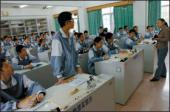There’s a long-running debate about how the skills of U.S. students compare with those of their peers in nations like China. A recent study seeks to cut through the speculation with research from both nations’ university systems.
In an article published in the journal Science, a team of researchers found that first-year Chinese university students easily beat American freshmen in a test of their knowledge of specific scientific concepts in mechanics, electricity, magnetism. Yet the U.S. students equaled their Asian counterparts when it came to a measure of their broader scientific reasoning ability.
The students tested in the study were freshmen science and engineering majors enrolled in calculus-based introductory physics courses in both the United States and China. They were tested before receiving any college-level instruction in the topics, so presumably, the researchers, from Ohio State University, were gauging skills picked up in K-12.
The Chinese students’ strong performance in science knowledge was especially evident in mechanics, where most of those tested scored in the area of 90 percent correct. The American students’ scores varied widely, from about 25-75 percent.

The authors note the differences between the Chinese and American science curricula as likely factors in explaining the differences. In China, every student goes through the same physics courses in grades 8-12, the authors say. (I’m assuming they mean if those students have access to schools and teachers at all. This is no sure thing in some villages and regions in China.) Physics courses in China tend to be algebra-based, and the emphasize the cultivation of conceptual understanding and problem-solving skills, they report. In the United States, on the other hand, only one out of three high school students enrolls in a two-semester physics course.
As far as students’ science reasoning goes, the authors point to research that shows that “inquiry-based science"—basically, the idea of using hands-on lessons and having students learn science as scientists actually go about it—is likely to help students’ performance in this area. Not enough of that kind of teaching is going on today, they suggest.
“The current style of content-rich STEM education,” the article says,"even when carried out at a rigorous level, has little impact on the development of students’ scientific -reasoning abilities.”
Here’s a summary of the results, and a link to the full article.
